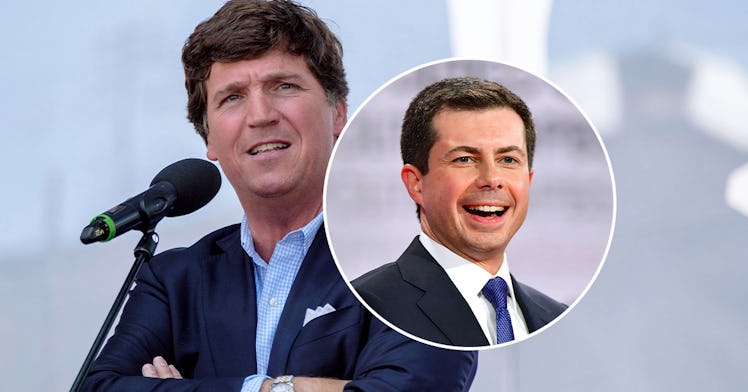Tucker Carlson Mocking Buttigeg’s Paternity Leave Misses This Crucial Point
Paternity leave is both important and widely popular across party lines

Tucker Carlson stokes the rage machine by strategically attacking people – often from minority groups – for attention. It’s a lucrative schtick for both him and Fox News, so the best course of action is typically to ignore him and deprive the hot take cycle of oxygen. But his attack last night directed at Transportation Secretary Pete Buttigieg for taking paternity leave was particularly galling.
“Pete Buttigieg has been on leave from his job since August after adopting a child. Paternity leave, they call it, trying to figure out how to breastfeed. No word on how that went,” Carlson said during a rant about supply chain issues and inflation that veered into dad-shaming and homophobia.
On a factual basis, Carlson’s statement doesn’t stand up. Buttigieg and his husband Chasten didn’t adopt a child in August. They adopted twins. And while Buttigieg spent four weeks “mostly offline” from work while he and his husband adjusted to life as parents, a spokesperson for the Department of Transportation told Politico that Buttigieg has begun “ramping up activities” even while taking time off with his growing family.
Just this past week, Buttigieg attended a meeting with President Joe Biden on supply chain bottlenecks and participated in virtual events to promote the infrastructure bill with the Commercial Club of Chicago and the Citizen Budget Commission of New York.
He also made media appearances on MSNBC, CNN, Bloomberg TV, CNBC and the NPR Politics Podcast.
And while the current supply chain and inflation emergencies demand attention, the Deputy Secretary of Transportation, Polly Trottenberg, is absolutely capable of carrying the load. She served for seven years as the Transportation Commissioner for New York City and served in the Obama administration as the Assistant Secretary and Under Secretary for Policy at the US Department of Transportation. So the ship is in steady hands.
But all this aside, Carlson’s dig misses two crucial points: paternity leave is highly beneficial to kids, and it’s popular on a broad basis. An April 2021 YouGov poll of more than 21,000 US adults found that more than two-thirds of Americans say companies should offer both mothers and fathers paid parental leave.
As Fatherly co-founder Mike Rothman noted in his May testimony on paid parental leave before the House Ways and Means Committee, a 2018 report from the Organization for Economic Cooperation and Development ranked the U.S. dead last among 41 countries for parental leave laws. And a nationwide survey conducted by Small Business Majority and Main Street Alliance showed that 70% of small businesses support a federal program to guarantee access to paid leave.
Rothman also emphasized in his testimony that policies such as paid family leave are also beneficial to businesses. “Family-first culture is not just the right thing to do — it has an impact on the bottom line,” Rothman said. “Several studies have found that paid family leave is associated with better workplace morale, higher levels of productivity, and less worker turnover. One study of OECD countries, of which the United States is one, found that if the U.S. were to adopt a 15-week paid maternity leave plan, productivity would increase 1.1 percent over time.”
But even without those advantages, the United States should adopt more comprehensive parental leave policies solely based on how beneficial it is for kids. Richard Petts, a sociologist who specializes in research on parental leave, made this argument in an interview with Fatherly earlier this year.
“If you’re there for the birth, if you’re there for the first few weeks or months after you bring your child home, you are able to develop that attachment,” said Petts. “Not only do fathers develop that attachment to their children, but children develop an attachment to their fathers as well. And so you know that that bond, that sense of attachment is really powerful. So emotional bonds and attachments happen.”
And as Rothman pointed out in his testimony, paternity leave strengthens and stabilizes the families that kids grow up in. “Taking paternity leave of any length, Petts has found in his own research, has been associated with happier, more satisfying marriages, and reduces the probability of divorce, because child-rearing stress doesn’t rely primarily on moms. Taking leave helps dads become engaged dads who can take care of their children, and their homes, confidently and competently.”
Balancing parenting and work responsibilities necessitates imperfect solutions. But the status quo regarding paternity leave in the US is inexcusably inadequate, and fathers like Pete Buttigieg who create healthy boundaries for the good of their families should be celebrated so that paternity leave might become accessible to more families instead of maliciously derided with homophobic shots from Tucker Carlson.